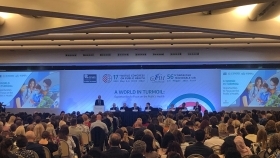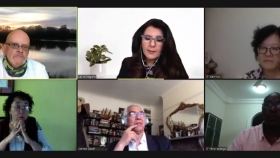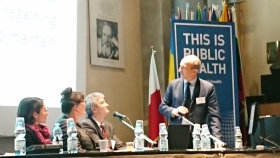
by strengthening education and training
of public health professionals
for both practice and research



The Association of Schools of Public Health in the European Region (ASPHER)
ASPHER is the key independent European organisation dedicated to strengthening the role of public health by improving education and training of public health professionals for both practice and research.Secretariat updates
Alison McCallum, Ariane Bauernfeind, Mary Codd, Colette Cunningham, Manfred Green, Meri Koivusalo, Henrique Lopes, Avi Magid, Jose Martin Moreno, John Middleton, Dorit Nitzen, Alena Petrakova, Gaetano Pierpaolo Privitera, John Reid, Judit Simon, Brian Wong, Lore Leighton, Robert Otok, Nadav Davidovitch, Henrique Barros.
On behalf of the ASPHER Public Health Emergencies Task Force.
Download the Briefing paper: WHO’s Role in a Changing World: Why It Still Matters
Summary:
The World Health Organization (WHO) is an essential global institution that plays a unique and irreplaceable role in safeguarding public health worldwide. Without it, a similar umbrella organization would have to be created to address the critical gaps it fills. Below is an analysis of why WHO is necessary, what it does, the functions it covers that other institutions do not and the unique contributions it makes to global health.
WHO is the only global health authority with a universal mandate to coordinate international public health efforts by consensus of its members. Its core mission includes disease prevention, emergency response, and strengthening healthcare systems worldwide. Without WHO, there would be a fragmented response to global health challenges, leading to greater inefficiencies, delays, and disparities in health outcomes.
As the primary forum for global health governance, WHO holds the unique responsibility and convening power to bring together those accountable for public health, such as ministries of health from its member states, on equal and collegial grounds. This protected space has been instrumental in fostering collaboration, allowing countries to collectively address health challenges while upholding an environment of solidarity and mutual respect, even amid disagreements. This role is particularly crucial in the face of rising global infodemics, where misinformation, anti-science rhetoric, and anti-vaccination narratives—sometimes amplified by influential international actors, including governments—threaten public trust in health interventions. WHO remains essential in safeguarding a focused and evidence-based approach to global health priorities.
While multiple organizations work in global health (e.g., UNICEF, the World Bank, Gavi, NGOs, regional health bodies), none provide the same comprehensive, coordinated, and legally binding global oversight as the WHO.
WHO is indispensable in preventing, detecting, and responding to global health threats, ensuring equitable access to healthcare, and setting international health policies. No other organization can fulfil this role comprehensively. If WHO did not exist, the world would need to create it to avoid chaos in global health governance, disease control, and emergency response. Its role as an umbrella institution and ability to provide a safe, non-partisan space for all countries to meet, debate, negotiate and agree ensures that no country is left behind in tackling health challenges that transcend borders.
Terms of use · Transparency statement ·Tel: +32 2 735 0890 ·Skype: ASPHERskype ·Mail: office@aspher.org ·Share:
ADDRESS
Aspher SecretariatUM Brussels Campus
Av de l'Armée / Legerlaan 10
BE-1040 Brussels





